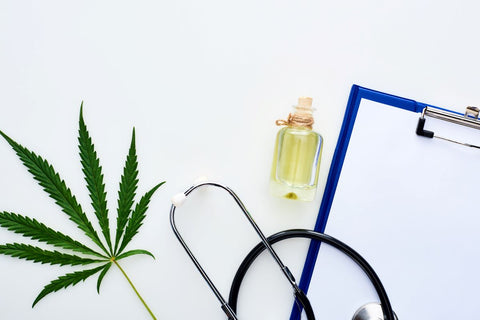Popular demand for CBD continues its upward trend as more people seek a natural solution to various ailments and conditions. Examples include anxiety disorders, chronic pain, inflammation, insomnia, and seizure disorders.
CBD can help address these issues without many of the side effects of pharmaceutical drugs. And because it is non-intoxicating, CBD is now legal to purchase over the counter in the UK.
Studies have proven CBD to be safe, effective, and well-tolerated—even at high doses. Before beginning a CBD regimen, however, it’s important to understand how it may interact with other prescription drugs and medications.
Here’s the skinny on what other drugs should not be taken with CBD.
Understanding drug interactions & metabolism
Drug metabolism refers to how your body breaks down therapeutic compounds and substances into metabolites. This dictates the rate at which they are eliminated from your system.
Metabolism typically occurs in the liver, where most relevant enzymes are located. The process is achieved in numerous ways. Examples include:
- oxidation
- reduction
- hydrolysis
- hydration,
- conjugation
- condensation
- isomerisation
In any case, the purpose is to make it easier for your body to flush out a foreign substance.
Note that the rate of metabolism is different for everyone. People with exceptionally fast metabolisms can excrete substances even before feeling any effects. On the other hand, those with very slow rates of metabolism may experience severe side effects from a standard medicinal dose.
Metabolism related drug interactions
Metabolism related drug interactions occur when the presence of one substance in your body affects the metabolism of another by inhibiting an enzyme known as CYP450. Depending on the combination of substances, the rate of metabolism can be sped up or slowed down.
In the former case, the compounds are removed from your system at an unusually high rate, reducing their therapeutic effect (this can be a severe problem for someone taking medicine to treat or manage a health condition).
In the latter case, the compounds stay in your system for a longer period of time, increasing the risk of unpleasant side effects and toxicity.
The next section explains how CBD may interact with other medications.
CBD's interactions with common drugs & prescription medications
CBD is not a biologically inert compound. That means it undergoes chemical reactions which are necessary for drug interactions.
According to Harvard Medical School, CBD can interact with various supplements as well as prescription and non-prescription (over the counter) medications.
Consider, for example, that CBD is known to have a mild sedative effect. As a result, many people use it as a natural sleep aid.
By the same token, taking large doses of CBD oil during the day may cause unwanted drowsiness. This effect can be exaggerated if you take CBD alongside other medications with sedative properties (opioids, benzodiazepines, antidepressants, etc.).
Returning to the concept of metabolism-related drug interactions, it’s important to recognise that CBD can interfere with and inhibit the CYP450 enzyme mentioned above. When this happens, your body cannot metabolise certain medications as efficiently as it otherwise would.
Again, depending on the interaction, this might (1) render the medication ineffective or (2) increase the likelihood and severity of side effects.
Bear in mind that the potential interactions can work both ways, meaning CBD might disrupt the metabolism of another substance or vice versa.
What drugs should not be taken with CBD?
Below is a list of multiple medications that should not be taken with CBD products due to potentially serious interactions.
- warfarin—an anticoagulant or blood thinner
- amiodarone—a medication used to treat heart rhythm problems
- clobazam, lamotrigine, valproate, and other anti-seizure drugs
- levothyroxine—a thyroid medication
The grapefruit warning
Scientific literature has identified over 85 medications that negatively interact with grapefruit (including grapefruit juice). The reason for this is a set of chemicals in grapefruit called furanocoumarins.
These chemicals are known to inhibit CYP450 and slow down the rate of metabolism, heightening the risk of adverse effects from other substances.
It remains to be seen whether CBD inhibits metabolism to the extent that grapefruit does. In the meantime, avoid taking CBD along with any medication that includes a grapefruit warning on its label.
Common pharmaceutical drug categories that interact with grapefruit include:
- statins
- calcium channel blockers
- anticoagulants
- antiplatelet medicines
- ciclosporin and immunosuppressants
- cytotoxic medicines
Side effects to keep an eye out for
If, while taking CBD, the following side effects appear or become more pronounced, consider decreasing your dosage:
- drowsiness
- sedation
- nausea
- fatigue
- diarrhoea
- changes in appetite
- high blood pressure
In addition, pay close attention to the effects of other medications you’re taking. If you notice a sudden decrease in their effectiveness, stop taking CBD and consult your GP.
Potential solutions
You may want to try different products to see how each affects you. For instance, topical CBD products like balms and lotions don’t make their way into your bloodstream the way CBD oil does. They’re therefore less likely to bring about CBD’s potential drug interactions.
When in doubt, speak to your doctor. They can advise you regarding how to incorporate CBD into your lifestyle in a safe, effective, and sustainable way.



